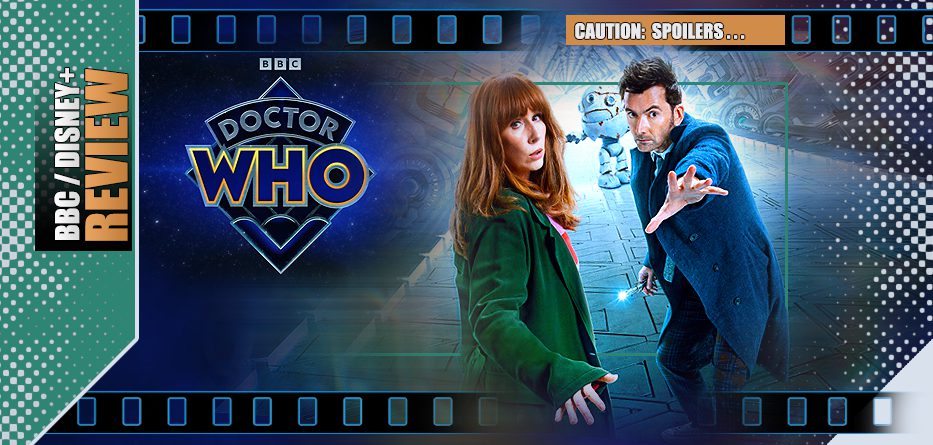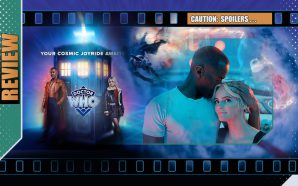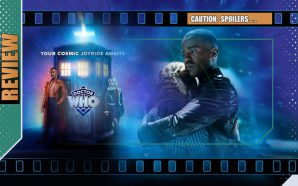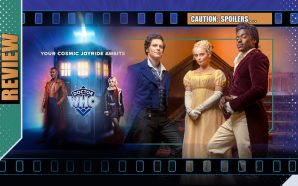The Tardis isn’t acting well to having its newly-minted console suddenly decaffeinated and after a momentary diversion to 1666, it deposits the Doctor and Donna on a strange starship, before Vworping away for repairs. As the two look around, it seems as if they are alone… there’s just a silent, solitary robot making very slow steps along an expansive corridor and a serious lack of stars outside, but no immediate threats. But is that really Donna the Doctor is confiding in? Is that really the Doctor that Donna is chiding for his curiosity? It becomes clear that they aren’t alone and that something is on the ship and it wants not only access to their minds and perceptions, but perhaps a way to escape using the Tardis.
But if you can’t trust anyone besides yourself, how can you even think of a way to survive?
*spoilers*
In this day and age, perhaps more so than any other era, it’s almost impossible to completely surprise your audience. Some people actively seek spoilers for their favourite shows, others run and hide from even the slightest chance of knowing key points going in and still get the brunt of pre-publicity. Some tune in out of blind brand loyalty, some to merely hate-watch and find pre-defined faults. The internet – yes, I’m looking at you – makes the spread of such information (sometimes disinformation) hit light-speed and often the only hope is that you may know something, but not everything. Some noted that last week’s episode The Star Beast, didn’t feel like an anniversary special. Yes, it only had one Doctor (discounting the DoctorDonna) and the stakes were less galactic than you’d expect, but the strong counter-argument is that it took its tale from an early Doctor Who Weekly strip and that it was only the first salvo in a month that will see four major stories on screen, each running close to an hour. You can certainly use a personal barometer to subjectively assess the results, but it’s hard to deny the sheer momentum.
So, it’s actually something of a joy, albeit a double-sided, double-jointed one, to sit down for another Doctor Who special and barely know anything other than the basics: that the title is Wild Blue Yonder, the Fourteenth incarnation is travelling with Donna Noble once more and that an accidental spill of coffee of the console has sent the machine hurtling… somewhere… somewhere scary. And there’s possibly a robot. Even with a few minutes to go before broadcast, Disney+ hadn’t even acknowledged it existed (perhaps that’s too much ‘playing it cool‘?)
The flip side of the unknown is getting to know it. The expectations for those ‘secrets’ can lead to the wildest speculation and perhaps unreasonable expectations. Given that almost all of the episode was shot in-situ, in-studio led many to believe that there would be something huge and significant in the works. The Powers-That-Be didn’t do much to calm things down. There were token denials, but none of great conviction and given that a lot of rumours and leaks (however wild or blue) had been proven to be correct about the specials, many went in presuming there would be… something to it all. Yet, realistically, nothing short of a Second Coming could likely tempt Christopher Eccleston back into on-screen Doctor Who, perhaps thinking ‘Susan’ might show up was unlikely and even the newly-Disneyfied franchise has some budget limitations…another ‘dark Tardis’ episode? Perhaps, but… So, how to play then pay-off that balance?
Doctor Who has the potential to educate, illuminate, postulate (and sometimes exterminate), but its primary goal should be to entertain…it actually does a bit of all of those in moderation. Does ‘Wild Blue Yonder‘ do enough? That’s subjective. What it doesn’t do – and this is largely the fault of Russell T Davies’ perchance for hyperbole – is do anything new… it’s fun but it borrows from itself with relish…
The result is both fun and frustrating – liking what’s there but missing what could have also been in the mix. Director by Tom Kingsley had previously noted that there were elements of both Aliens and The Thing in his entry and that’s not untrue… and Davies and Tennant talking about their interesting co-stars is technically true (though, it’s truer to say this is a two-hander with some extra hands thrown in). There’s genuine body-horror here as alien versions of the Doctor and Donna either confound with how similar they are or suddenly twist into nightmarish incarnations. If The Star Beast was consistently manic, Wild Blue Yonder does best with a slow-burn. The first minutes on the spaceship are played to broader character humour – accentuating the Doctor’s built-in nose for trouble and mystery and Donna’s ‘let’s go kick its arse‘ style… and it’s sad to know that this classic duo won’t be sharing the Tardis for long. Then the tension builds: The way that it introduces the fact that there are doubles of our travellers is initially quite subtle and it’s only when the deception slips (and the first body parts get out of shape) that we realise the innate danger on show. Jimbo the robot, one of the few things glimpses in advance, isn’t the expected cute robot sidekick or menace one might have expected, but a mechanical device that both intrigues and then pays-off. In short, there’s much to like here.
Doctor Who has the potential to educate, illuminate, postulate (and sometimes exterminate), but its primary goal should be to entertain. So, while there were undoubtedly some missed opportunities here that an anniversary episode could have played with (because, seriously, shape-shifting aliens prying into a Time Lord’s psyche couldn’t pull out a few past incarnations for a momentary appearance or line just for old time’s sake?) it actually does a bit of all of those in moderation. Does it do enough? That’s subjective. What it doesn’t do – and this is largely the fault of Russell T Davies’ perchance for hyperbole – is do anything new… it’s fun, but it borrows from itself with relish, reworking rather than recharging. Yes, the Disney budget allows for shiny, widescreen jaw-dropping backdrops which do away with unconvincing solitary sets and create mile-long panoramas that dazzle and distract (and bode well for the new season), but there’s a handful of Who episodes from which Wild Blue Yonder casually draws a straight line of inspiration. There’s the unidentified aliens and ‘beware-of-arrogance’ aspect of superb psychological-thriller Midnight, the dimensionally-challenged aliens of Flatline, the doppelgangers of The Rebel Flesh / The Almost People and even a touch of The Girl Who Waited. If you want to take it that way, the Doctor might even have had a hand in creating the legend of previously-mentioned ‘Space Vampires’. But, arguably all those examples with their more streamlined, precise targets, did what they did just a little better than Wild Blue Yonder does when it tries to pull them all together. That’s not to say Wild Blue Yonder isn’t a fun, scary and complex-enough ride (with Davies underlining that he accepts some controversial elements created from the Chibnall run), only that it ultimately feels like a decent bottle-episode of the show rather than a true and fulfilling anniversary special. It plucks at a resonating string rather than spotlights what the whole instrument can do.
Other sidelined highlights are the ones that book-end the main plot. Whoops, there goes mavity as the Doctor and Donna encounter Sir Isaac Newton (though technically, this contradicts a Tom Baker-era boast) pre-titles which is silly fun. Then, in the closing seconds, we finally get to see Bernard Cribbins reprising the role of Wilf and bringing as much emotion in that brief appearance as all the rest of the running-time combined. It’s sad that Cribbins’ passing robbed us of a bigger presence, but the fact that the episode was dedicated to him at the end is an assured doff of the woolly hat. He will be missed.
And then, it’s onwards to next week’s The Giggle and only then will we be able to judge how the anniversary paid of… and who gets the last laugh…
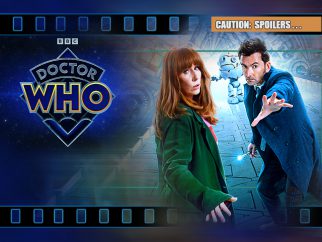
- Story8
- Acting9
- Direction8
- Production Design / VFX9

